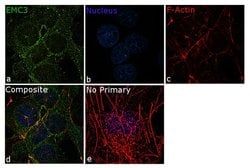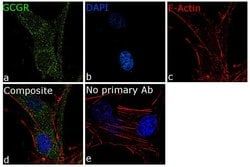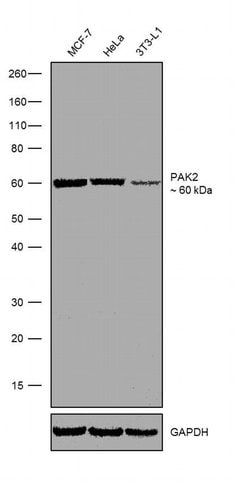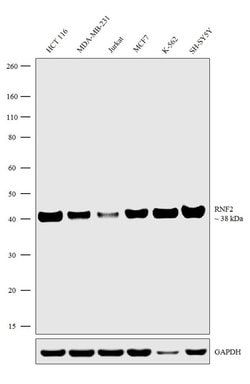Phospho-Tyrosine Hydroxylase (Ser40) Recombinant Rabbit Monoclonal Antibody (5H9L20), Invitrogen™
Manufacturer: Invitrogen
Select a Size
| Pack Size | SKU | Availability | Price |
|---|---|---|---|
| Each of 1 | 70-322-5-Each-of-1 | In Stock | ₹ 42,720.00 |
70-322-5 - Each of 1
In Stock
Quantity
1
Base Price: ₹ 42,720.00
GST (18%): ₹ 7,689.60
Total Price: ₹ 50,409.60
Antigen
Phospho-Tyrosine Hydroxylase (Ser40)
Classification
Recombinant Monoclonal
Concentration
0.5 mg/mL
Formulation
PBS with 0.09% sodium azide; pH 7.4
Gene Accession No.
P04177, P07101
Gene Symbols
TH
Immunogen
Peptide corresponding to human Phospho-Tyrosine Hydroxylase GRRQ[pS]LIED
Quantity
100μg
Primary or Secondary
Primary
Target Species
Human, Rat
Product Type
Antibody
Isotype
IgG
Applications
Immunocytochemistry, Western Blot
Clone
5H9L20
Conjugate
Unconjugated
Gene
TH
Gene Alias
dystonia 14; DYT14; DYT5b; EC 1.14.16.2; HGNC:11782; Th; TH isoform 3; TH isoform a; th1; TH-4; The; TY3H; TYH; TYH antibody; Tyrosine 3-hydroxylase; tyrosine 3-monooxygenase; tyrosine hydroxylase
Host Species
Rabbit
Purification Method
Protein A
Regulatory Status
RUO
Gene ID (Entrez)
25085, 7054
Content And Storage
Store at 4°C short term. For long term storage, store at -20°C, avoiding freeze/thaw cycles.
Form
Liquid
Related Products
Description
- This antibody is predicted to react with Human, Monkey, Cat, Mouse
- Recombinant rabbit monoclonal antibodies are produced using in vitro expression systems
- The expression systems are developed by cloning in the specific antibody DNA sequences from immunoreactive rabbits
- Then, individual clones are screened to select the best candidates for production
- The advantages of using recombinant rabbit monoclonal antibodies include: better specificity and sensitivity, lot-to-lot consistency, animal origin-free formulations, and broader immunoreactivity to diverse targets due to larger rabbit immune repertoire
- Tyrosine hydroxylase (TH) is an enzyme involved in the synthesis of catecholamine neurotransmitters dopamine, epinephrine, and norepinephrine
- In all species, catecholamine synthesis is regulated by the interaction of TH with a cofactor, tetrahydrobiopterin (BH4)
- BH4 binds to the TH catalytic domain, resulting in enzymatic activity
- Unlike TH in non-primate species, four human TH mRNA splice variants (hTH1-hTH4) have been isolated
- These variants are identical in their catalytic domain, but differ in their N-terminal, regulatory domains
- TH is also responsible for the conversion of L-tyrosine to L-dopa
- TH plays a key role in the physiology of adrenergic neurons
- The role of TH in the synthesis of catecholamine neurotransmitters suggests a correlation between the enzyme and a number of neuropathogenic diseases including: Parkinson's disease, schizophrenia, Segawa syndrome, and dystonia, as well as a variety of cardiovascular diseases.










